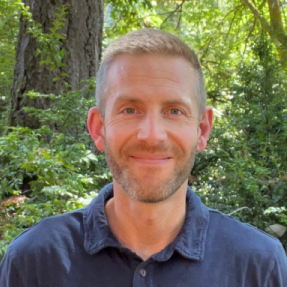Employee Spotlight
September 15, 2023
Kenny Bruemmer

Program Analyst
Homeless Patient Aligned Care Team (HPACT), Homeless Programs Office (HPO)
Q: How long have you worked for VA?
A: It will be 14 years this month.
Q: Tell me about your current role as a program analyst with HPACT.
A: I do a lot of project management – working on mobile medical units, suicide prevention initiatives, and opioid overdose prevention. I also give technical assistance to HPACT field sites throughout the country.
Q: As our office lead for suicide prevention, can you tell us why it’s important to address homelessness and housing instability as part of suicide prevention?
A: The average person experiences distress throughout the course of their life. The types of distress we all experience – relationship problems, money problems, job problems, health problems – are all exacerbated if someone doesn't have a stable place to live.
I don't know about you, but I've been pretty distressed a few times in my life, and I was stably housed. I can only imagine how much worse it must be for people trying to cope with huge life stressors, such as not having a stable place to sleep, shower, or store their belongings.
To help people have a foundation for dealing with normal life stressors, having stable housing is crucial.
Q: How has your time at VA changed your perspective on homelessness?
A: Prior to working in a homelessness services setting, I naively assumed that most homeless people just need a place to live and then they'll inevitably get back on their feet on their own. For people who become homeless and self-resolve their homelessness in a short period of time, that's often the case. It's more likely to just be an economic predicament.
But for people who tend to stay homeless for longer stretches of time, once they do become housed, they often need long-term support to help encourage them to get medical care, mental health care, and manage their money. Maybe they need in-home caregiver services, help with transportation, or something else.
I now know that a portion of the homeless population needs some degree of assistance, potentially indefinitely, to increase their odds of remaining housed.
Q: What do you think most people get wrong about homelessness?
A: This may sound flippant, but I don't mean it to be. I think there's often a misconception that homelessness is a life of leisure, and that people who are homeless are enjoying the benefits of not having a job, paying bills, or having all the commitments that come with a standard housed life.
But from what I've witnessed working in homeless settings, especially visiting encampments, homeless shelters, and transitional housing, most people who are homeless are in a rough situation.
They're having to carry their belongings everywhere they go. They don't have access to a shower. They may only get to eat once a day or less. I think the average person experiencing homelessness is having a miserable day-to-day existence, and there's very little, if any, pleasure or leisure in their life during their period of homelessness.
Q: Given all that you've experienced, what's your why for this work?
A: It's mainly two things. I really do believe that Veterans have earned access to a higher level of benefits through their military service. I take pride in being a part of that system of benefits and working to sustain it to make it better over time to adapt to the needs of Veterans.
Also, both of my grandfathers were World War II Veterans. I didn’t know either, but through family lore, I've heard about the toll that their service took on them and their families, and the way that's trickled through the generations.
That motivates me to try to help Veterans improve their health and their quality of life – so they can have a positive relationship with their families and their communities.
















